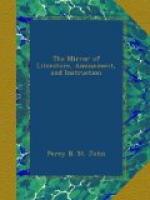[12] Lingard’s “History of England,” vol. iv. p. 190. 4to edit.
[13] Vide Speed’s “Annals,” p. 1029.
[14] “Life and Raigne of Henry the Eighth,” p. 341. edit. 1649.
It may not, perhaps, prove uninteresting to our readers, or quite irrelevant to the subject, to close this brief account of the marriage of Anne Boleyn, with the copy of a letter from that queen to “Squire Josselin, upon ye birth of Q. Elizabth,” preserved among the manuscripts in the British Museum.[15]
[15] Harleian MSS. No. 787.
“By the Queen—Trusty and well beloved wee greet you well. And whereas it hath pleased ye goodness of Almighty God of his infinite mercy and grace to send unto vs at this tyme good speed in ye deliverance and bringing forth of a Princess to ye great joye and inward comfort of my lord. Us, and of all his good and loving subjects of this his realme ffor ye which his inestimable beneuolence soe shewed unto vs. We have noe little cause to give high thankes, laude and praysing unto our said Maker, like as we doe most lowly, humbly, and wth all ye inward desire of our heart. And inasmuch as wee undoubtedly trust yt this our good is to you great pleasure, comfort, and consolacion; wee therefore by these our Lrs aduertise you thereof, desiring and heartily praying you to give wth vs unto Almighty God, high thankes, glory, laud, and praising, and to pray for ye good health, prosperity, and continuall preservation of ye sd Princess accordingly. Yeoven under our Signett at my Lds Manner of Greenwch,[16] ye 7th day of September, in ye 25th yeare of my said Lds raigne, An. Dno. 1533.”
S.I.B.
[16] Queen Elizabeth was born at
the ancient Palace of
Greenwich,
or as it was then called, “the Manner of Plesaunce,”
one
of the favourite residences of Henry VIII.
* * * * *
MEMORABLE DAYS.
* * * * *
COLLOP MONDAY.
Collop Monday is the day before Shrove Tuesday, and in many parts is made a day of great feasting on account of the approaching Lent. It is so called, because it was the last day allowed for eating animal food before Lent; and our ancestors cut up their fresh meat into collops, or steaks, for salting or hanging up until Lent was over; and even now in many places it is still a custom to have eggs and collops, or slices of bacon, for dinner on this day.
In Westmoreland, and particularly at Brough, where I have witnessed it many times, the good people kill a great many pigs about a week or two previous to Lent, which have been carefully fattened up for the occasion. The good housewife is busily occupied in salting the flitches and hams to hang up in the “pantry,” and in cutting the fattest parts of the pig for collops on this day. The most luscious cuts are baked in a pot in an oven, and the




